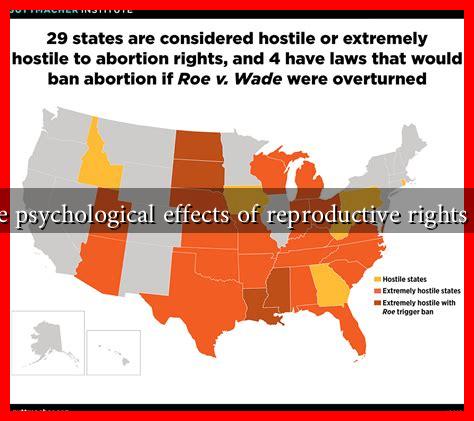-
Table of Contents
The Psychological Effects of Reproductive Rights Restrictions
Reproductive rights are fundamental to individual autonomy and health, yet many regions around the world face increasing restrictions on these rights. The psychological effects of such restrictions can be profound, impacting not only individuals but also families and communities. This article explores the various psychological consequences of reproductive rights restrictions, supported by research, case studies, and statistics.
Understanding Reproductive Rights
Reproductive rights encompass a range of issues, including access to contraception, abortion, and comprehensive sex education. When these rights are restricted, individuals may experience a range of psychological effects, including anxiety, depression, and feelings of helplessness.
The Impact of Anxiety and Depression
Research indicates that restrictions on reproductive rights can lead to increased levels of anxiety and depression among affected individuals. A study published in the journal Health Affairs found that women who were denied abortions reported higher levels of anxiety and depression compared to those who were able to access the procedure. The emotional turmoil often stems from:
- Fear of Unwanted Parenthood: Many individuals face the prospect of raising a child they are not prepared for, leading to significant stress.
- Loss of Control: Restrictions can create a sense of helplessness, as individuals feel their choices are being dictated by external forces.
- Stigmatization: Those seeking reproductive health services may face societal stigma, further exacerbating feelings of isolation and depression.
Case Studies: Real-World Implications
Several case studies illustrate the psychological impact of reproductive rights restrictions. For instance, in Texas, the implementation of stringent abortion laws led to a significant decrease in available services. A report by the Guttmacher Institute highlighted that many women experienced increased anxiety and distress due to the uncertainty surrounding their reproductive choices. The study noted:
- Women reported feeling trapped and overwhelmed by their circumstances.
- Many experienced relationship strain due to differing views on reproductive choices.
- Some women resorted to unsafe methods to terminate pregnancies, leading to further psychological trauma.
Long-Term Psychological Consequences
The long-term psychological effects of reproductive rights restrictions can be severe. Individuals may carry the emotional burden of their experiences for years, affecting their mental health and overall well-being. Some potential long-term consequences include:
- Chronic Stress: Ongoing stress from navigating restrictive environments can lead to chronic health issues.
- Relationship Issues: Strain on personal relationships can result from differing opinions on reproductive choices, leading to conflict and separation.
- Impact on Future Choices: Individuals may become hesitant to pursue future reproductive health services, fearing similar restrictions or stigma.
Community and Societal Effects
The psychological effects of reproductive rights restrictions extend beyond individuals to impact families and communities. When reproductive rights are limited, entire communities may experience:
- Increased Poverty Rates: Unplanned pregnancies can lead to financial instability, affecting community resources.
- Generational Trauma: The psychological effects can be passed down, affecting future generations’ mental health and reproductive choices.
- Social Division: Conflicting views on reproductive rights can create rifts within communities, leading to social unrest.
Conclusion: The Need for Comprehensive Reproductive Rights
The psychological effects of reproductive rights restrictions are far-reaching and deeply impactful. From increased anxiety and depression to long-term emotional consequences, the implications are significant for individuals and communities alike. As society continues to grapple with these issues, it is crucial to advocate for comprehensive reproductive rights that empower individuals to make informed choices about their bodies and futures. Ensuring access to reproductive health services is not just a matter of health; it is a matter of mental well-being and social equity.


